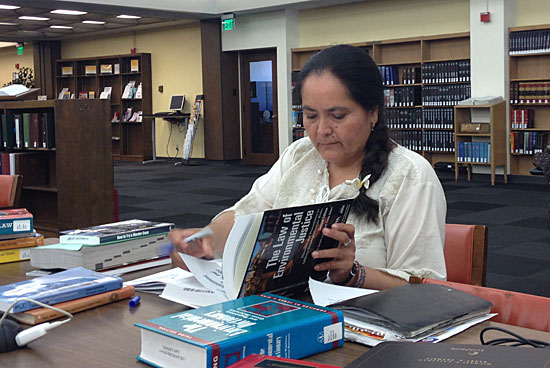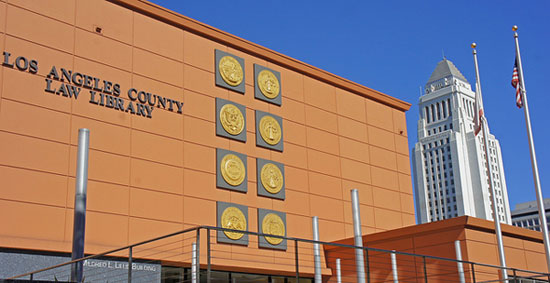
Martha Jimenez has used the Law Library to fight legal battles from L.A.’s eastside to Zacatecas, Mexico.
Perhaps no one knows how to use the Los Angeles County Law Library better than Martha Jimenez.
Since her college days at UCLA, the 45-year-old community activist has been taking advantage of the public facility in L.A.’s civic center to research an array of legal topics, from environmental regulations and landlord-tenant laws to city planning issues and Mexican civil procedure.
“This is like the international safe haven to address issues,” Jimenez said.
In the 1990s, she used the library to fight back when the Mexican government tried to take her grandparents’ house by eminent domain. Jimenez researched the relevant statutes and procedures and her family filed suit. In the end, they emerged victorious over the then-governor of Zacatecas.
“The governor did not know how to write his court document,” Jimenez said. “It was here that I learned that process.”
More recently, Jimenez used the library to protect her local community of City Terrace on the eastside from becoming a waste storage site for the City of Santa Clarita and a private trash hauler. After researching environmental regulations, she appealed to the City of L.A. and the Sanitation Districts of L.A. County. Again, she won.
“I empowered my community and collected 5,000 signatures,” Jimenez said. “We organized and said, ‘You cannot come into our community.’ And they stopped.”
Jimenez is one of an increasing number of self-represented litigants who’ve discovered the L.A. Law Library, said Sandra Levin, the library’s executive director. Since taking the position 19 months ago, Levin estimates that daily attendance has risen about 50%, from 200 to 300 people per day.
“I told my board that my goal is to come with a request to replace the carpet because we wore it out,” Levin said.
Hiring a lawyer simply isn’t an option for a growing segment of the population, Levin said. She and her librarians want to bridge the resulting gap in access to justice.
“There’s a real crisis right now in our society and our courts because many people are faced with legal issues and can’t afford representation. Most average citizens don’t know where to turn,” Levin said, adding that about 70% of litigants in family law cases now do not have attorneys “and the numbers are growing in basic civil cases, too.”
Over the past few years, the library has made significant upgrades, including a reorganized reference desk and computers, a renovated exterior and a new training center. “It looks totally different than before,” Levin said.
To improve outreach, Levin is offering classes and workshops taught by library staff, attorneys and nonprofit organizations. Topics include how to clear criminal records, researching with online legal databases, preparing for family law trials and how to file for a legal name change. All are provided free or for a small fee, ranging from $10 to $35.
Her reference staff handles the front lines, where people come in with all sorts of legal problems. Among the most common are evictions, divorces and child custody matters. Others, like the man who sued a boating company after being left out at sea for 12 hours, require digging a bit deeper into the public collection, the second largest in the United States after the Library of Congress.
Levin recalls two parents who came in because their child’s school wouldn’t allow them to visit during the day. “They wanted to see the school in operation and check on their child,” Levin said. “The librarians here helped them find the statute that says that you have a right to go into a public school to see your child.”
Ralph Stahlberg, the head reference librarian, remembers one homeless man who filed a lawsuit against the police for taking his belongings. “He came here and got resources,” Stahlberg said. “He fought it and won.”
Neel Agrawal is the research librarian in charge of the global law collection. He said small business owners often show up seeking assistance with the complex legal requirements regarding exporting products, trade routes and other concerns that large businesses typically hire law firms to handle.
Librarians direct their patrons to books written for non-lawyers or, if a visitor is more sophisticated, to more complex reference books. Still others need advice on the basics, like how to address a judge (“your honor,” rather than “sir” or “madam”.)
While unrepresented litigants have been on the rise, the trend was spotted by the State Bar of California back in 1997. In response, the California Commission on Access to Justice was created “to explore ways to improve access to civil justice for Californians living on low and moderate incomes.” Later, the Judicial Council of California—the state’s policymaking body for the courts—formed a Task Force on Self Represented Litigants. In 2004, the task force issued a Statewide Action Plan for Serving Self-Represented Litigants. Central to the plan was the creation of courthouse self-help centers to provide one-on-one assistance with family law and eviction cases.
Business is booming. According to Superior Court spokesperson Mary Hearn, more than 200,000 “incidents of service” have been provided annually during the past few years at centers across the county, including in Santa Monica, San Fernando and Van Nuys. The law library, meanwhile, collaborates with them to identify what kinds of services are most needed.
“The courthouses are wonderful but they have limited scope,” Levin said. “They offer a pretty wide range of family law issues and some landlord-tenant issues, but beyond that there isn’t much assistance.”
Nonprofit organizations like Public Counsel and Legal Aid Foundation of Los Angeles also help people who can’t afford an attorney, but still can’t meet the enormous demand.
The law library also serves people who aren’t facing litigation, as well as those who can afford an attorney. Understanding legal rights in advance can resolve or prevent costly court battles. Levin gives the example of a worker who believes she may have been sexually harassed, but isn’t sure. One hour of research at the library could prevent an unnecessary fight that might damage the person’s career interests.
“Someone has to teach people how to understand their rights, represent themselves in court and do legal research,” Levin said. “That’s what we do.”

The sweeping exterior renovation of the downtown Law Library was completed in 2012.
Posted 8/14/14






